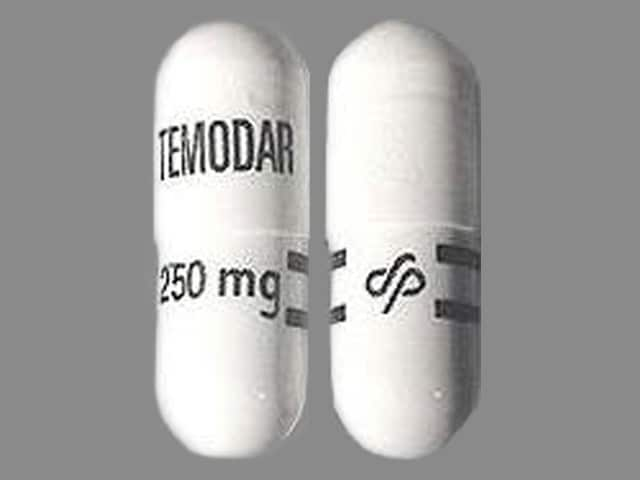What is Temodar?
Temodar (temozolomide) is a prescription medicine used to treat adults with certain brain cancer tumors. Temodar blocks cell growth, especially cells that grow fast, such as cancer cells. Temodar may decrease the size of certain brain tumors in some patients.
It is not known if Temodar is safe and effective in children.
What is the most important information I should know about Temodar?
- Temodar may cause birth defects. Male and female patients who take Temodar should use effective birth control. Female patients and female partners of male patients should avoid becoming pregnant while taking Temodar.
See the section "What are the possible side effects of Temodar?" for more information about side effects.
Who should not take Temodar?
Do not take Temodar if you:
- have had an allergic reaction to dacarbazine (DTIC), another cancer medicine.
- have had a red itchy rash, or a severe allergic reaction, such as trouble breathing, swelling of the face, throat, or tongue, or severe skin reaction to Temodar or any of the ingredients in Temodar. If you are not sure, ask your doctor. See the end of the leaflet for a list of ingredients in Temodar.
What should I tell my healthcare provider before taking Temodar?
Tell your doctor about all your medical conditions, including if you:
- are allergic to dacarbazine (DTIC) or have had a severe allergic reaction to Temodar. See "Who should not take Temodar?"
- have kidney problems
- have liver problems
- are pregnant. See "What is the most important information I should know about Temodar?"
- are breast-feeding. It is not known whether Temodar passes into breast milk. You and your doctor should decide if you will breast-feed or take Temodar. You should not do both without talking with your doctor.
Tell your doctor about all the medicines you take, including prescription and non-prescription medicines, vitamins, and herbal supplements. Especially tell your doctor if you take a medicine that contains valproic acid (Stavzor, Depakene).
Know the medicines you take. Keep a list of them and show it to your doctor and pharmacist when you get a new medicine.
How should I take Temodar?
Temodar may be taken by mouth as a capsule at home, or you may receive Temodar by injection into a vein (intravenous). Your doctor will decide the best way for you to take Temodar.
There are two common dosing schedules for taking Temodar.
- Some people take Temodar for 42 days in a row (possibly 49 days depending on side effects) with radiation treatment. This is one cycle of treatment. After this, you may have "maintenance" treatment. Your doctor may prescribe 6 more cycles of Temodar. For each of these cycles, you take Temodar one time each day for 5 days in a row and then you stop taking it for the next 23 days. This is a 28-day maintenance treatment cycle.
- Another way to take Temodar is to take it one time each day for 5 days in a row only, and then you stop taking it for the next 23 days. This is one cycle of treatment (28 days). Your doctor will watch your progress on Temodar and decide how long you should take it. You might take Temodar until your tumor gets worse or for possibly up to 2 years.
- Your dose is based on your height and weight, and the number of treatment cycles will depend on how you respond to and tolerate this treatment.
- Your doctor may modify your schedule based on how you tolerate the treatment.
- If your doctor prescribes a treatment regimen that is different from the information in this leaflet, make sure you follow the specific instructions given to you by your doctor.
Temodar Capsules:
- Take Temodar Capsules exactly as prescribed.
- Temodar Capsules come in different strengths. Each strength has a different color cap. Your doctor may prescribe more than one strength of Temodar Capsules for you, so it is important that you understand how to take your medicine the right way. Be sure that you understand exactly how many capsules you need to take on each day of your treatment, and what strengths to take. This may be different whenever you start a new cycle.
- Talk to your doctor before you take your dose if you are not sure how much to take. This will help to prevent taking too much Temodar and decrease your chances of getting serious side effects.
- Take each day's dose of Temodar Capsules at one time, with a full glass of water.
- Swallow Temodar Capsules whole. Do not chew, open, or split the capsules.
- If Temodar Capsules are accidentally opened or damaged, be careful not to breathe in (inhale) the powder from the capsules or get the powder on your skin or mucous membranes (for example, in your nose or mouth). If contact with any of these areas happens, flush the area with water.
- If you vomit Temodar Capsules, do not take any more capsules. Wait and take your next planned dose.
- The medicine is used best by your body if you take it at the same time every day in relation to a meal.
- To lessen nausea, try to take Temodar on an empty stomach or at bedtime. Your doctor may prescribe medicine to prevent or treat nausea, or other medicines to lessen side effects with Temodar.
- See your doctor regularly to check your progress. Your doctor will check you for side effects that you might not notice.
- If you miss a dose of Temodar, talk with your doctor for instructions about when to take your next dose of Temodar.
- Call your doctor right away if you take more than the prescribed amount of Temodar. It is important that you do not take more than the amount of Temodar prescribed for you.
Temodar for Injection:
- You will receive Temodar as an infusion directly into your vein. Your treatment will take about 90 minutes.
- Your doctor may prescribe medicine to prevent or treat nausea, or other medicines to relieve side effects with Temodar.
What should I avoid while taking Temodar?
- Female patients and female partners of male patients should avoid becoming pregnant while taking Temodar. See “What is the most important information I should know about Temodar?"
What are the possible side effects of Temodar?
Temodar can cause serious side effects.
- See “What is the most important information I should know about Temodar?"
- Decreased blood cells. Temodar affects cells that grow rapidly, including bone marrow cells. This can cause you to have a decrease in blood cells. Your doctor can monitor your blood for these effects.
- White blood cells are needed to fight infections. Neutrophils are a type of white blood cell that help prevent bacterial infections. Decreased neutrophils can lead to serious infections that can lead to death. Other white blood cells called lymphocytes may also be decreased.
- Platelets are blood cells needed for normal blood clotting. Low platelet counts can lead to bleeding. Tell your doctor about any unusual bruising or bleeding.
Your doctor will check your blood regularly while you are taking Temodar to see if these side effects are happening. Your doctor may need to change the dose of Temodar or when you get it depending on your blood cell counts. People who are age 70 or older and women may be more likely to have their blood cells affected.
- Pneumocystis pneumonia (PCP). PCP is an infection that people can get when their immune system is weak. Temodar decreases white blood cells, which makes your immune system weaker and can increase your risk of getting PCP. All patients taking Temodar will be watched carefully by their doctor for this infection, especially patients who take steroids. Tell your doctor if you have any of the following signs and symptoms of PCP infection: shortness of breath and/or fever, chills, dry cough.
- Secondary cancers. Blood problems such as myelodysplastic syndrome and secondary cancers, such as a certain kind of leukemia, can happen in people who take Temodar. Your doctor will watch you for this.
- Convulsions. Convulsions may be severe or life-threatening in people who take Temodar.
- Liver side effects have been reported, which very rarely included death.
Common side effects with Temodar include:
- nausea and vomiting. Your doctor can prescribe medicines that may help reduce these symptoms.
- headache
- feeling tired
- loss of appetite
- hair loss
- constipation
- bruising
- rash
- paralysis on one side of the body
- diarrhea
- weakness
- fever
- dizziness
- coordination problems
- viral infection
- sleep problems
- memory loss
- pain, irritation, itching, warmth, swelling or redness at the site of infusion
- bruising or small red or purple spots under the skin
Tell your doctor about any side effect that bothers you or that does not go away.
These are not all the possible side effects with Temodar. For more information, ask your doctor or pharmacist.
Call your doctor for medical advice about side effects. You may report side effects to FDA at 1-800-FDA-1088.
Temodar Images
General information about the safe and effective use of Temodar
Medicines are sometimes prescribed for purposes other than those listed in the Patient Information leaflet. Do not use Temodar for a condition for which it was not prescribed. Do not give Temodar to other people, even if they have the same symptoms that you have. It may harm them.
This leaflet summarizes the most important information about Temodar. If you would like more information, talk with your doctor. You can ask your pharmacist or doctor for information about Temodar that is written for health professionals.
For more information, go to www.TEMODAR.com or call 1-877-888-4231.
How should I store Temodar?
- Store Temodar Capsules at 77°F (controlled room temperature). Storage at 59°F to 86°F (15°C to 30°C) is permitted occasionally.
- Keep Temodar Capsules out of the reach of children and pets.
What are the ingredients in Temodar?
Temodar Capsules:
Active ingredient: temozolomide.
Inactive ingredients: lactose anhydrous, colloidal silicon dioxide, sodium starch glycolate, tartaric acid, stearic acid.
The body of the capsules is made of gelatin and is opaque white. The cap is also made of gelatin, and the colors vary based on the dosage strength. The capsule body and cap are imprinted with pharmaceutical branding ink, which contains shellac, dehydrated alcohol, isopropyl alcohol, butyl alcohol, propylene glycol, purified water, strong ammonia, potassium hydroxide, and ferric oxide.
Temodar 5 mg: The green cap contains gelatin, titanium dioxide, iron oxide yellow, sodium lauryl sulfate, and FD&C Blue #2.
Temodar 20 mg: The yellow cap contains gelatin, sodium lauryl sulfate, and iron oxide yellow.
Temodar 100 mg: The pink cap contains gelatin, titanium dioxide, sodium lauryl sulfate, and iron oxide red.
Temodar 140 mg: The blue cap contains gelatin, sodium lauryl sulfate, and FD&C Blue #2.
Temodar 180 mg: The orange cap contains gelatin, iron oxide red, iron oxide yellow, titanium dioxide, and sodium lauryl sulfate.
Temodar 250 mg: The white cap contains gelatin, titanium dioxide, and sodium lauryl sulfate.
Temodar for Injection:
Active ingredient: temozolomide.
Inactive ingredients: mannitol, L-threonine, polysorbate 80, sodium citrate dihydrate, and hydrochloric acid.





